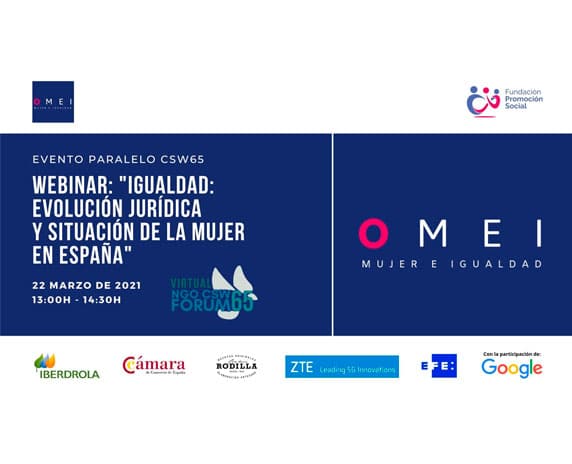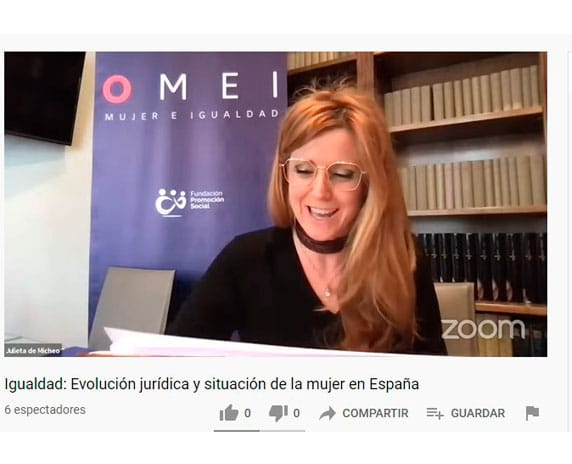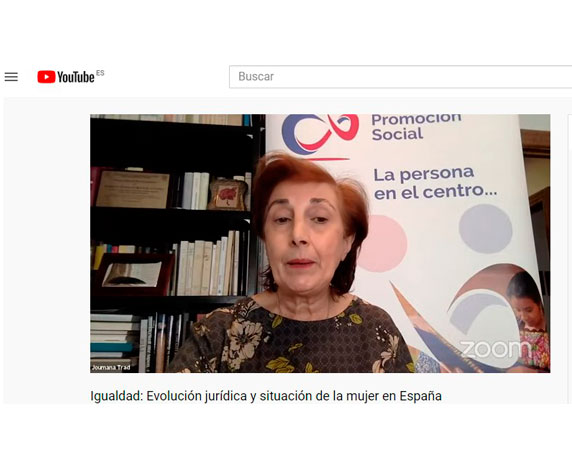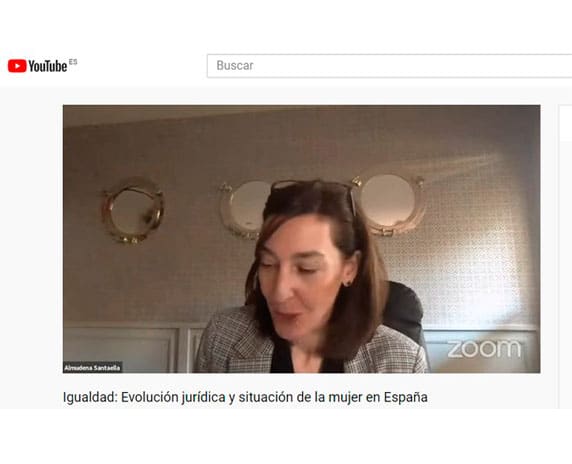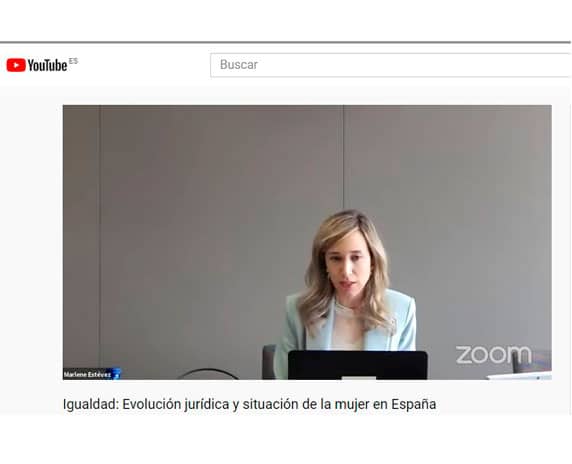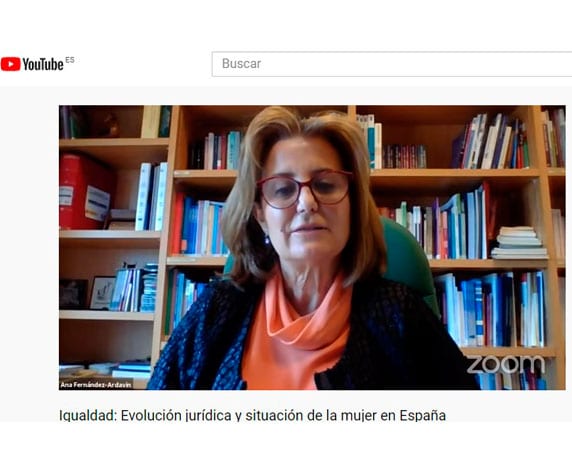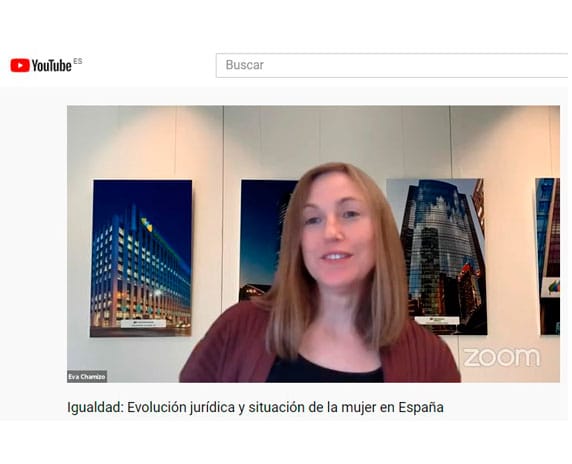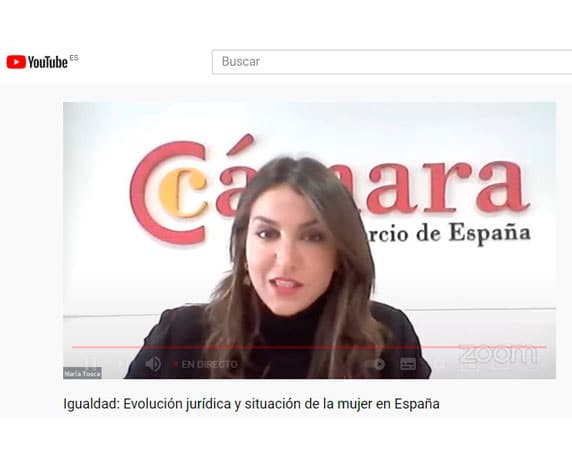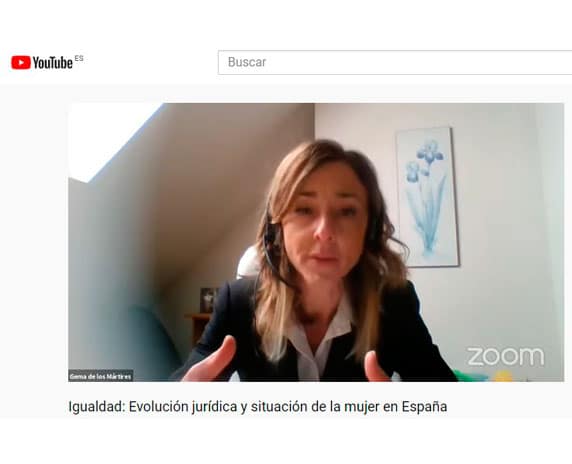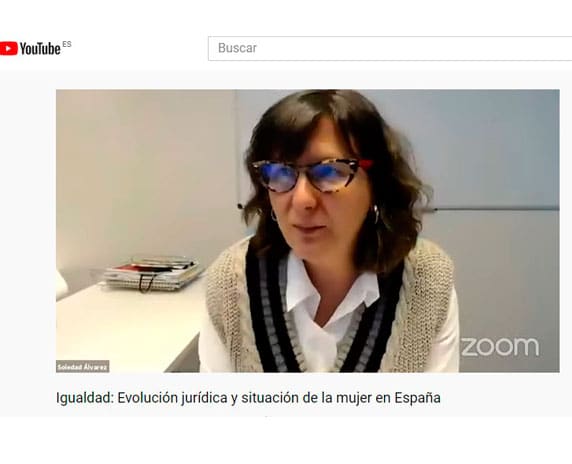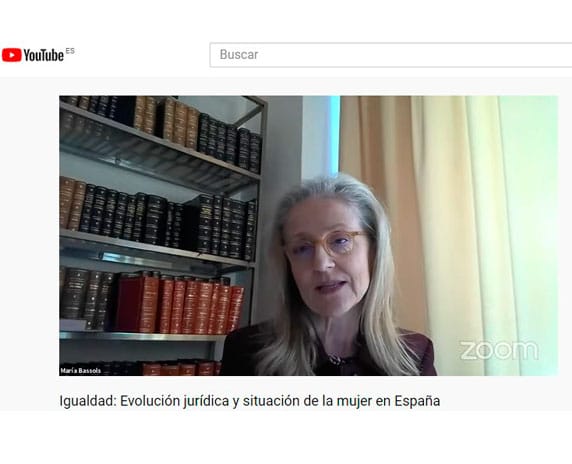Social Promotion Foundation, through its Women and Equality Observatory (OMEI), organised the Round Table: “Equality: Legal evolution and the situation of women in Spain”, on the platform of the CSW65 NGO Virtual Forum.
Real equality in Spain has been the thematic axis for the debate and reflection of this side event of the 65th session of the UN Commission on the Status of Women (CSW), which has counted with the participation of leading women in different areas of society.
Jumana Trad, President of Social Promotion Foundation, briefly introduced the work of the Foundation in promoting equality and opened the dialogue.
Almudena Santaella, Dr. in Philosophy and Corresponding Academician at the Royal Academy of Jurisprudence and Legislation, addressed key issues such as the legislative evolution and political actions of real equality in Spain based on the results of her study “Co-responsibility in work and family life. A subject on legal equality”, published by Aranzadi, which offers a detailed analysis of these equality policies and their legislative evolution from the perspective of work-life balance and co-responsibility.
Almudena Santaella spoke about the term co-responsibility and how concepts such as work-life balance and care are perceived as discriminatory towards women, who bear greater responsibility.
According to her,
“The welfare model in Spain is still family-based, with the burden of responsibility falling on the lack of state resources. The role of grandparents is a reality”, (Almudena Santaella, author of the study “Co-responsibility in work and family life. A subject on legal equality.”)
She also spoke about the need to establish a fair distribution of roles between women and men in terms of care. In recent years, parental and care leave has been regulated and maternity leave has been equalised between women and men in 2021.
In coherence with the study and within this framework, with the capacity to bring together the public and private sectors, companies, universities, the media and the third sector, the round table addressed the balance, current situation and objectives of real equality with women as reference points and agents of change in different spheres of society.
Marlen Estévez, President of Women in a Legal World, completed the first block that analysed equality from a legal point of view.
For her, the legislative advances, many of which have come from European directives, have been very powerful in recent years, and she referred to paternity leave as an important milestone, as well as equal pay.
She believes that reality is ahead of the law and this is a great advantage in terms of adapting to reality. She believes that legislation is basic, although education is the key to promoting real equality.
On the role of education in the advancement of equality and the recognition of rights, Ana Fernández-Ardavín, Vice-Rector for Academic Development and Organisation at Villanueva University, analysed whether we are training in equality through education ; and Eva Chamizo, Director of European Affairs at Iberdrola, addressed the need to teach women the new STEM professions.
Ana Fernández Ardavin referred to the processes of equality in Spain at university level but warned against the fact that in high school education there are more women than men, but this is not the case in postgraduate studies and in further training.
She is not in favour of teaching gender equality as a subject and equates it with training in other necessary cross-cutting concepts such as teamwork, but not as a subject.
For her, from a point in the achievement of a degree of equality, as happens in Spain, a positive spiral is produced with the referents (teachers) and influencers, women are better students and become true influencers.
Eva Chamizo addressed the need to teach new STEM professions to women and argued that gender diversity in companies is a substantial element of productivity.
She pointed out that there are only 15% women in the trades coming from vocational training, and that is why they are present in the educational spheres at the moment when women decide what to study.
She believes that there is substantial pressure on women to choose their studies.
Women are not encouraged by their families and their environment to study very masculinised professions. Often so that they don’t have to work among men. They need to be given confidence.
In relation to the role of companies as an engine of transformation, María Tosca, Director of Employment, Training and Entrepreneurship of the Spanish Chamber of Commerce, discussed the support offered by her institution to advance equality; and Gema de los Mártires, Sales Director (Orange Account) of ZTE Spain, analysed the initiatives of the world of telecommunications in the face of the digital gap.
Soledad Álvarez, Director of Strategy at Agencia EFE, presented the Agency’s commitment in the field of Communication, a great vector of change, through the EFEminista (EFEminist) initiative, a space with content that gives visibility to inspiring women.
She called for journalism with a gender focus, without constructed under a male vision stereotypes. She believes that it is very important to have well-informed journalists, perhaps through a subject on equality.
She commented that the EFE Agency has an Equality Manual with recommendations to give visibility to women, to avoid patterns and stereotypes, to identify sources of information including women and to avoid asymmetries such as, for example, male doctor, female nurse, male boss, female secretary, etc.
In EFE they also have an Equality Plan, for the first time they have a woman president and they are the majority in the management team.
The round table was moderated by Julieta de Micheo, Director of the OMEI Observatory.
The closing remarks were made by María Bassols, Ambassador Deputy Permanent Representative of Spain to the United Nations, who spoke about respect for diversity and the need to eradicate discrimination against women in a broad sense.
The event was sponsored by Iberdrola, the Rodilla restaurant chain, the Spanish Chamber of Commerce, ZTE Spain and Agencia EFE.
The event could be followed via YouTube Live on the Social Promotion Foundation channel.





